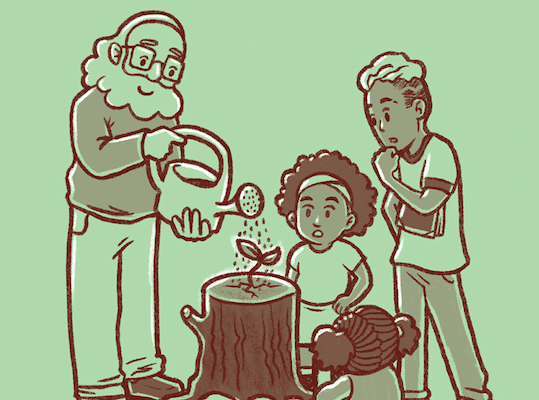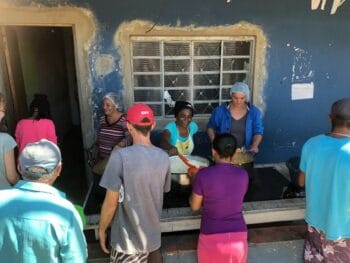Dear friends,
Greetings from the desk of the Tricontinental: Institute for Social Research.
Exactly two years ago, I walked with my colleagues from Tricontinental: Institute for Social Research through the Camp Marielle Vive (‘Marielle Lives’) outside of Valinhos in the state of São Paulo, Brazil with a great sense of déjà vu. The camp resembles so many other communities of the desperately poor on our planet. The United Nations calculates that one in eight people on our planet–one billion human beings–live in such precariousness. The homes are made of a jumble of materials: blue tarpaulin sheets and bits of wood, corrugated iron sheets and old bricks. A thousand families live in Camp Marielle Vive, named after the Brazilian socialist Marielle Franco, who was assassinated in March 2018.
Camp Marielle Vive is not an ordinary ‘slum’, a word with so many negative connotations. The mood in many slums is desolate, criminal gangs and religious organisations providing them with fragile social glue. But Camp Marielle Vive exudes a different aura. Flags of the Landless Workers’ Movement (MST) are everywhere. The residents give off a quiet and friendly dignity, many of them wearing t-shirts or caps from their organisation. They have an air of preparation: prepared to defend their camp from eviction by the local authorities and prepared to build a genuine community for themselves.
At the centre of the camp is a community kitchen where some of the residents eat their three meals. The food is simple but nutritious. Nearby is a small clinic that is visited by a doctor once a week. Outside the homes are flower beds and vegetable gardens. The municipal authorities of the adjoining town stopped allowing the school bus to pick up children from the camp and transport them to the town’s school. As parents struggled to get their children to school every day, Camp Marielle Vive built an on-site classroom for after-school activities, which has continued during the pandemic.
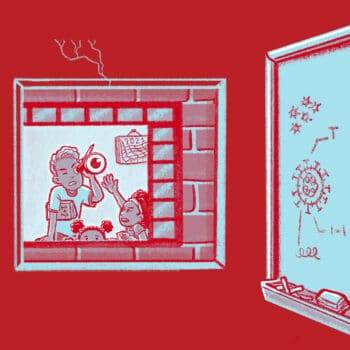 Tassi Barreto of the MST told me in early August 2021 that the camp has had no deaths to COVID-19 because they have ‘taken firm action to avoid the spread of infection’. The local municipality denied the camp water, which is–as Barreto says–‘a human rights crime’. The residents continued developing their collective work, strengthening the community kitchen and the community health centre, and advancing agroecological production in the vegetable garden, which is built in the shape of a mandala. The garden has been so productive that the camp has been able to sell baskets of produce in the nearby cities of Valinhos and Campinas.
Tassi Barreto of the MST told me in early August 2021 that the camp has had no deaths to COVID-19 because they have ‘taken firm action to avoid the spread of infection’. The local municipality denied the camp water, which is–as Barreto says–‘a human rights crime’. The residents continued developing their collective work, strengthening the community kitchen and the community health centre, and advancing agroecological production in the vegetable garden, which is built in the shape of a mandala. The garden has been so productive that the camp has been able to sell baskets of produce in the nearby cities of Valinhos and Campinas.
The classroom sits in a prominent part of Camp Marielle Vive. But, Barreto told me, ‘the children and young people of school age had great difficulty because there were no face-to-face classes [at the municipal school] and there were virtual activities in which they could not participate’. The camp’s leadership had to innovate: worksheets had to be printed and distributed to the students each fortnight and–since the public school teachers could not review them–the camp turned to educators from the UNICAMP, a nearby public university, to supervise their work. Education for the children has been a serious challenge.
From Tricontinental: Institute for Social Research comes a dossier, CoronaShock and Education in Brazil: One and a Half Years Later (August 2021), that goes into depth about the crisis of public education as a result of the pandemic. Our dossier cites a UNICEF study that shows that, by the end of 2020 in Brazil, roughly 1.5 million children and adolescents had abandoned their studies and 3.7 million were formally enrolled but were unable to access remote classes.
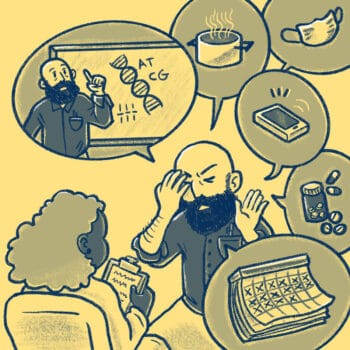 The United Nations estimates that 90% of students across the world–1.57 billion children–were unable to attend in-person schooling during the length of the pandemic, many of them told to go online. However, a recent UNESCO study shows that half of the world’s population does not have an internet connection. That’s 3.6 billion people with no internet access. According to the study, ‘At least 463 million or nearly one-third of students globally cannot access remote learning, mainly due to a lack of online learning policies or lack of equipment needed to connect from home’. Half the global population has no internet, and many of those who are able to access the internet cannot afford the technologies and tools required to participate in distance learning. The digital divide is even more sharp along gender lines: in the less developed countries, only 15% of women used the internet in 2019, compared to 86% of women in the so-called developed world.
The United Nations estimates that 90% of students across the world–1.57 billion children–were unable to attend in-person schooling during the length of the pandemic, many of them told to go online. However, a recent UNESCO study shows that half of the world’s population does not have an internet connection. That’s 3.6 billion people with no internet access. According to the study, ‘At least 463 million or nearly one-third of students globally cannot access remote learning, mainly due to a lack of online learning policies or lack of equipment needed to connect from home’. Half the global population has no internet, and many of those who are able to access the internet cannot afford the technologies and tools required to participate in distance learning. The digital divide is even more sharp along gender lines: in the less developed countries, only 15% of women used the internet in 2019, compared to 86% of women in the so-called developed world.
The turn to digital education has emboldened mega-corporations to enclose the commons of public education, making it harder and harder for the masses of children to have access to any education at all. Big business sees the opportunity clearly. As Microsoft explained, ‘The fallout from COVID-19, continuing advances in digital technology, and intensifying pent-up demand for student-centred learning have combined to present an unprecedented opportunity to transform education across whole systems’. As Bia Carvalho of Brazil’s youth movement (Levante Popular da Juventude) told us for our dossier, ‘For these businessmen, distance education is more profitable because it allows them to cut a part of their expenses and it gives them access to a much larger number of students. From the point of view of [looking at] education as a commodity, where they sell classes, distance education makes a lot more sense’. Public funds have already been used to underwrite the massive expansion of private digital education systems.
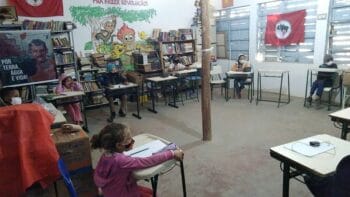
After-school classroom in Camp Marielle Franco, 2021 (photograph by the Communication Sector, MST–Sao Paulo)
Our dossier closes by highlighting three key issues: the need to increase investment in public educational infrastructure (while ensuring no stealth privatisation of education); the need to value, train, and support the professional development of teachers; and the need to struggle for a new educational project. The latter is of great importance. It asks questions about the purpose of education, which sets the stage upon which young people learn to ask questions about their society, about their values, about the discrepancy between their values and their social institutions, and about what one can do about that discrepancy. There is a direct line from the student protests that convulsed Chile in 2011, in South Africa in 2015, and India in 2015-16 to the sentiment in our dossier. This new educational project needs to be elaborated. It is a necessity.
When we walked through the Camp Marielle Vive in 2019, two young women, Ketley Júlia and Fernanda Fernandes, joined us. They told us about their schooling, including the English classes they were taking at the camp’s classroom. In the past two years, Ketley joined other women in the camp as a key leader in her community. She coordinates the mandala garden, helps at the storeroom, and organises the donations of clothes and blankets, all of this despite fighting off challenges to her own health.
‘In the midst of the barbarism’, Barreto told me, ‘hope always has a way of appearing’. Ketley is now pregnant, ‘a joy that encourages us in our struggle’, Barreto said. Fernanda now lives in Camp Irmã Alberta near São Paulo, where she continues in the MST as she raises two children. Fernanda’s children and Ketley’s child provide hope, but they also need hope to be fashioned through a world with a humane and hopeful educational project.
In 1942, the English poet, socialist, and pacifist Stephen Spender wrote ‘An Elementary School Classroom in a Slum’. The children in the slum school, Spender wrote, have a future ‘painted with a fog’, their maps ‘slums as big as doom’. We must break the windows of that slum, Spender wrote,
And show the children to green fields, and make their world
Run azure on gold sands, and let their tongues
Run naked into books the white and green leaves open
History is theirs whose language is the sun.
Warmly,
Vijay

